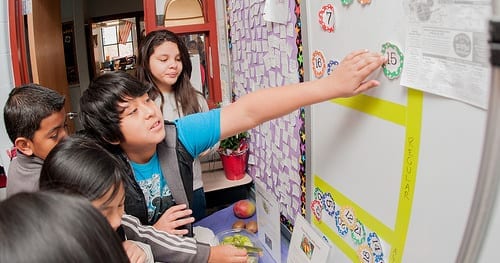Table of Contents
Even armed with the latest tools and the best of intentions, teachers struggle by Dr. Kendall Cotton Bronk
 Are you one of the many secondary education teachers who rank motivating students as their greatest professional challenge? Research reveals a steep and steady decline in student motivation from kindergarten through high school, and this makes a teacher’s job difficult. Even armed with the latest curriculum, cutting-edge technology, and the best of intentions, teachers are likely to struggle with a classroom full of unengaged and unmotivated students.
Are you one of the many secondary education teachers who rank motivating students as their greatest professional challenge? Research reveals a steep and steady decline in student motivation from kindergarten through high school, and this makes a teacher’s job difficult. Even armed with the latest curriculum, cutting-edge technology, and the best of intentions, teachers are likely to struggle with a classroom full of unengaged and unmotivated students.
Or maybe you do encounter exceptionally motivated students, but you worry they’re motivated for the wrong reasons. Working hard only to earn good grades, or only to ensure a class ranking, or only to get into an Ivy League college can lead to high levels of student stress, anxiety, depression, and burn-out.
The goal, of course, is to find a way to connect students in a genuine and positive way to their schoolwork, and recent research my colleagues and I have conducted suggests one way to do this: Help students discover their purpose in life. It may sound like a lofty aim, but a growing body of empirical research assures us it’s worth the effort.
 Students inspired to pursue a long-term goal that will allow them to contribute to the world in a personally meaningful way are grittier, more resilient, and likely to feel a greater sense of control over their lives and schoolwork, compared to their non-purposeful peers. They also tend to report that the work they do in school is more meaningful. This makes sense when you think about it: Students pursuing a purpose in life have a strong sense of where they are headed and what they hope to accomplish, and consequently, they are better able to see how their school work can get them there.
Students inspired to pursue a long-term goal that will allow them to contribute to the world in a personally meaningful way are grittier, more resilient, and likely to feel a greater sense of control over their lives and schoolwork, compared to their non-purposeful peers. They also tend to report that the work they do in school is more meaningful. This makes sense when you think about it: Students pursuing a purpose in life have a strong sense of where they are headed and what they hope to accomplish, and consequently, they are better able to see how their school work can get them there.
Cultivating purpose can help students thrive not only in the classroom, but also beyond. Studies find that relative to non-purposeful classmates, students with purpose are happier, more hopeful, and more satisfied with their lives. They also report lower levels of stress, anxiety, and depression. They even sleep better!
Students who know what they’re working for are much less likely to feel stressed by working hard. When they see how their work can help them make progress toward personally significant aims, what might otherwise feel like an overwhelming project becomes an exciting opportunity.
So how can teachers help students discover their purpose in life? Good news: Our research provides some simple, effective direction.
Model purpose
 For many educators, teaching is a calling. They enter the field because they genuinely care about young people and want to play a role in shaping the future generation. If this is the case for you, consider sharing the purpose you find in teaching with your students. Let students know why you became a teacher and what you hope to accomplish through your work. Doing so will not only improve your relationship with your students, but it also will introduce them to the language of purpose and help them reflect on their own purpose in life.
For many educators, teaching is a calling. They enter the field because they genuinely care about young people and want to play a role in shaping the future generation. If this is the case for you, consider sharing the purpose you find in teaching with your students. Let students know why you became a teacher and what you hope to accomplish through your work. Doing so will not only improve your relationship with your students, but it also will introduce them to the language of purpose and help them reflect on their own purpose in life.
Focus on the long-term
All too often we only ask students about their short-term aims and activities: Are you going to the homecoming dance? What colleges are you applying to? Are you trying out for the school play? We rarely ask them what they want out of life, what they hope to accomplish, or how they want to leave their mark. Adolescents are cognitively ready and eager to reflect on these kinds of abstract questions, and doing so can help them begin to articulate their purpose in life.
Encourage gratitude
 When we focus on the blessings in our lives and on the people who have blessed us, our research finds, we are naturally inclined to consider ways we want to give back, and contribution is an important component of purpose. Encourage your students to keep a gratitude journal, where they jot down three good things that happen to them each day, or to write a gratitude letter, where they thank someone who has helped them in their lives. These kinds of gratitude-inducing activities have been found to improve both mood and rates of purpose.
When we focus on the blessings in our lives and on the people who have blessed us, our research finds, we are naturally inclined to consider ways we want to give back, and contribution is an important component of purpose. Encourage your students to keep a gratitude journal, where they jot down three good things that happen to them each day, or to write a gratitude letter, where they thank someone who has helped them in their lives. These kinds of gratitude-inducing activities have been found to improve both mood and rates of purpose.
Focus on the real-world applications of your subject matter
As an educator, you probably see quite clearly how your subject prepares students to do important work in the real world, but often your students don’t see this. They may not understand how learning algebra will prepare them for the higher-level math classes they’ll need to become engineers or physicists. They may not realize that learning a foreign language is critical if they want to work in international relations. They may not see how developing writing skills prepares them for meaningful careers in law, marketing, and journalism. Emphasize the real-world applications. Doing so will help students connect their work in your classroom to their personally meaningful, far-horizon aims.
Access tools and resources
 Psychological research on purpose has exploded in the past fifteen years, and today you’ll find empirically based online resources — many available for free — that can help your students discover their purpose. For instance, encourage your students to participate in the Purpose Challenge (www.purposechallenge.org), where they can complete a set of purpose-fostering activities, write a purpose-inspired college essay, and enter that essay for a chance to win thousands of dollars in a college scholarship.
Psychological research on purpose has exploded in the past fifteen years, and today you’ll find empirically based online resources — many available for free — that can help your students discover their purpose. For instance, encourage your students to participate in the Purpose Challenge (www.purposechallenge.org), where they can complete a set of purpose-fostering activities, write a purpose-inspired college essay, and enter that essay for a chance to win thousands of dollars in a college scholarship.
Finally, helping students discover their purpose in life is not only good for them — it could also be good for you. Through the experience, you may reconnect with or discover your most personally meaningful aims, and the benefits of leading a life of purpose are equally available to all!
Author
 Kendall Cotton Bronk is an Associate Professor of Psychology at the Claremont Graduate University, where she leads the Adolescent Moral Development lab.
Kendall Cotton Bronk is an Associate Professor of Psychology at the Claremont Graduate University, where she leads the Adolescent Moral Development lab.
Over the past fifteen years, her research has explored the benefits of leading a life of purpose, the presence of purpose among diverse groups of adolescents, and the ways young people discover meaningful purposes for their lives.
She has authored a book, Purpose in Life: A Critical Component of Optimal Youth Development (Springer Publishers), and numerous peer-reviewed journal articles on the topic, and she helped develop the Purpose Challenge. She earned her doctorate in Educational Psychology from Stanford University.
Further Reading
- Edutopia – Questions Before Answers: What Drives a Great Lesson?
- PearsonEd – Encouraging Positive Student Engagement and Motivation: Tips for Teachers
- Reading Horizons – Seven Ways to Increase Student Engagement in the Classroom
